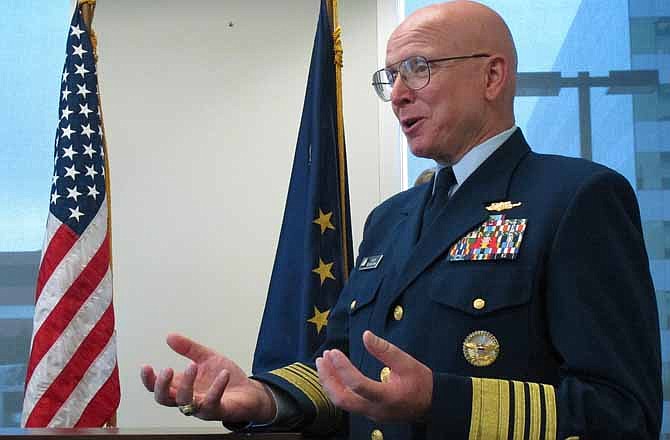ANCHORAGE, Alaska (AP) - Lessons learned from the Deepwater Horizon catastrophe in the Gulf of Mexico have helped the Coast Guard prepare for possible oil spills in the Arctic Ocean, the commandant of the agency said Wednesday.
Shell Oil hopes to drill exploratory wells this summer in the Chukchi Sea and Beaufort Sea and its two drill ships will be accompanied by 22 vessels dedicated to spill response.
Adm. Robert Papp told reporters that BP's rig was in the Gulf by itself when it exploded two years ago.
"If British Petroleum had all the resources on hand at the time that Shell has in place for drilling today, we probably would have been able to stop that spill much quicker and certainly more effectively," he said.
Papp spoke a day after escorting Homeland Security Secretary Janet Napolitano and three U.S. senators on a tour of the 418-foot national security cutter Bertholf. The vessel was moored at Cold Bay on the Alaska Peninsula, near the Aleutian Islands.
The Coast Guard will routinely assign a single cutter near drilling sites during the summer open water season and has staged forward operating personnel on shore. The nearest base is on Kodiak Island more than 750 miles southeast of the Bering Strait.
Papp emphasized, however, it will not be the Coast Guard's job to clean up oil if there's a spill in the far north.
"One cutter and the Coast Guard is not supposed to take care of the spill," he said.
Legislation passed in 1990 after the Exxon Valdez oil spill placed responsibility on the industry that profits from drilling.
"We review their response plans to make sure that they are in compliance, that they have the proper resources arranged for and on scene to be able to make an immediate response to anything that happens," Papp said.
He again said a spill is unlikely in the Arctic, and comparing shallow drilling there to deep water Gulf of Mexico drilling was like comparing "apples and oranges." The water depth off Alaska will be about 150 feet vs. 5,000 in the Gulf, he said, and Shell expects pressure in the oil reservoirs to be far less.
A single Shell vessel remains to be cleared by the Coast Guard, Papp said. Overall, the agency is ready, he said.
Sen. Mary Landrieu, D-La., chairwoman of Appropriation Committee's subcommittee on homeland security, said the Arctic is a profit center for the nation that needs more resources.
"It needs significant infrastructure, starting with more investments to give the Coast Guard what they need to get their job done," she said. "It's really a focal point for Homeland Security, keeping us safe, and we need a much more aggressive strategy for investment."

